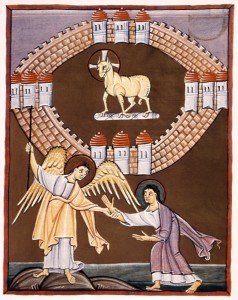 The last document in the canonical New Testament is Revelation or Apocalypse. It is named this because it speaks of the second coming of Jesus, the ending of this world, and its replacement by a new heaven and a new earth. It is probably the least read in our Church. It is also one of the most difficult to understand because it abounds in unfamiliar and extravagant symbolism, which at beast appears unusual to the modern reader. It has also become a mainstay for fundamentalist Christians and many of the evangelical Christians. Symbolic language, however, is one of the chief characteristics of apocalyptic literature, of which this book is an outstanding example. Such literature enjoyed wide popularity in both Jewish and Christian circles from 200 BCE to 200 CE.
The last document in the canonical New Testament is Revelation or Apocalypse. It is named this because it speaks of the second coming of Jesus, the ending of this world, and its replacement by a new heaven and a new earth. It is probably the least read in our Church. It is also one of the most difficult to understand because it abounds in unfamiliar and extravagant symbolism, which at beast appears unusual to the modern reader. It has also become a mainstay for fundamentalist Christians and many of the evangelical Christians. Symbolic language, however, is one of the chief characteristics of apocalyptic literature, of which this book is an outstanding example. Such literature enjoyed wide popularity in both Jewish and Christian circles from 200 BCE to 200 CE.
This book contains an account of visions in symbolic and allegorical language borrowed in part from the Old Testament, especially Ezekiel, Zachariah and the apocalyptic Book of Daniel. Whether these visions were real experiences of the author or simply literary conventions employed by him is an open question, the solution of which in no way adds to, or detracts from, the divine inspiration of the book.
The final two chapters describe the New Jerusalem descending to earth, a glorious city in which mourning, crying, pain and death are no more. In it is the throne of God and the Lamb. From it flows the river of life, on whose banks stands the tree of life, whose leaves are for the healing of the nations. It is a city of light. In the final verse of the vision: There will be no more night; they need no light of lamp or sun, for the Lord God will be their light (22:5). It is difficult to imagine a more powerful way to end the New Testament.
Because Revelation speaks about the second coming of Jesus and the events preceding it, it has, more often than not, been understood by some Christians to refer to events that are still in the future, and it could be soon.
This is the premise of Christian churches today that emphasize that the second coming may be near: what Revelation says will happen someday. It is also the premise of the recent series of Left Behind novels. All were bestsellers, totaling more than 70 million copies in the United States alone. They are about the final seven years of the world’s history, based on the Book of Revelation as interpreted by their authors.
Remember that St. Paul thought the second coming would be in his lifetime.
